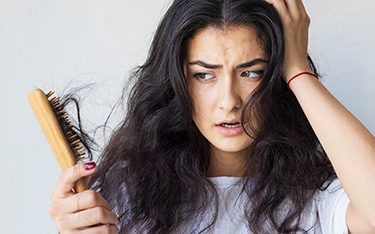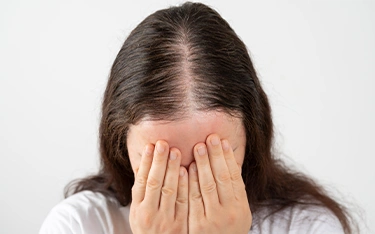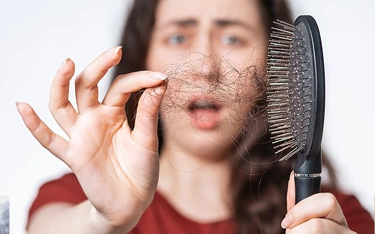FAQs
Your diet directly impacts hair health. Foods to prevent hair loss include iron-rich spinach, protein-packed eggs, and omega-3 fatty acids from salmon. Deficiencies in vitamins like biotin, zinc, and iron can weaken follicles, causing excessive shedding. A nutrient-rich diet ensures stronger, healthier hair.
The best foods for hair growth include spinach, walnuts, avocados, berries, eggs, and fatty fish. These foods provide biotin, vitamin E, omega-3 fatty acids, and protein, strengthening hair follicles, reducing thinning, and promoting regrowth. A balanced diet helps prevent excessive shedding and supports scalp health.
Iron is crucial for oxygen delivery to hair follicles. A deficiency reduces blood supply, weakening roots and leading to shedding. Food to control hair loss includes leafy greens, beans, nuts, and red meat, which boost iron levels, supporting healthy hair regrowth and reducing thinning.
DHT (a hormone linked to hair loss). It improves scalp circulation and promotes more vigorous hair growth. Pairing green tea with foods to eat for healthy hair, like avocados and almonds, enhances its effectiveness.
A well-balanced diet rich in biotin, vitamin A, iron, and protein prevents hair loss. Foods to eat to stop hair loss, such as eggs, yoghurt, and walnuts, strengthen roots and nourish the scalp, ensuring long-term hair health.
Dehydration weakens hair follicles, making hair dry, brittle, and prone to breakage. Drinking 2-3 litres of water daily supports scalp hydration, oil balance, and healthy hair regrowth. For the best results, pair hydration with nutrient-rich foods, like cucumbers and watermelon, to prevent hair loss.
Yes! High-sugar and processed foods raise DHT levels, causing weaker hair follicles and scalp inflammation. Foods that prevent hair loss, like nuts, seeds, and fatty fish, counteract these effects by reducing inflammation and strengthening hair strands naturally.
If your diet lacks essential vitamins, supplements can help. Biotin, zinc, iron, and omega-3 are crucial for hair health. However, it’s best to prioritise foods to eat for healthy hair, like dairy, spinach, and avocados, for natural nutrient absorption before relying on supplements.
Results vary, but you may notice stronger, healthier hair in 3-6 months with a nutrient-rich diet. Regular intake of foods to stop hair loss, like salmon, eggs, and berries, boosts hair regrowth by nourishing the scalp and strengthening hair strands.




